
Browse an alphabetical list of photographs. These historical images portray people, places, and events before, during, and after World War II and the Holocaust.
<< Previous | Displaying results 101-125 of 232 for "Photo" | Next >>
Portrait of Helen Keller, seated, reading Braille. September 1907. In 1933, Nazi students at more than 30 German universities pillaged libraries in search of books they considered to be "un-German." Among the literary and political writings they threw into the flames during the book burning were the works of Helen Keller.
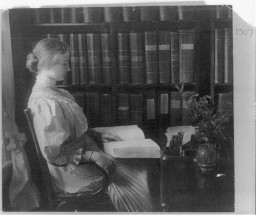
Portrait of Herschel Grynszpan taken after his arrest by French authorities for the assassination of German diplomat Ernst vom Rath. Grynszpan (1921-1943?). Born in Hannover, Germany, was the son of Polish Jews who had immigrated to Germany. In 1936 Grynszpan fled to Paris. On November 7, 1938, after having learned of the expulsion of his parents from Germany to Zbaszyn the Polish frontier, Grynszpan assassinated Ernst vom Rath, the third secretary of the German embassy in Paris. The diplomat's…
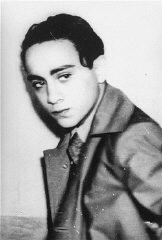
1942 portrait of Ita Guttman with her twin children Rene and Renate. When the twins were very young, the family moved to Prague. In the fall of 1941 the Germans arrested Ita's husband, Herbert. Subsequently, the twins and their mother were deported to Theresienstadt, and from there, to Auschwitz.
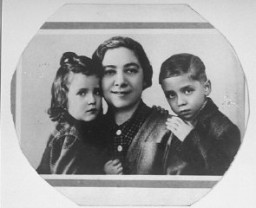
Portrait of James Ingo Freed, architect of the United States Holocaust Memorial Museum. New York, April 1992.
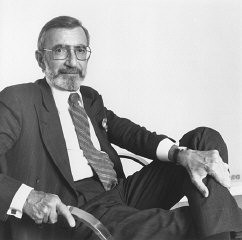
Jan Karski, underground courier for the Polish government-in-exile, informed the West in the fall of 1942 about Nazi atrocities against Jews taking place in Poland. Washington, DC, United States, 1943.
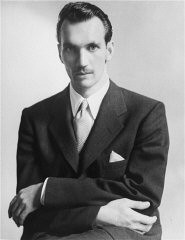
Portrait of Janusz Korczak, a Polish Jewish doctor and author who ran a Jewish orphanage in Warsaw, circa 1930.
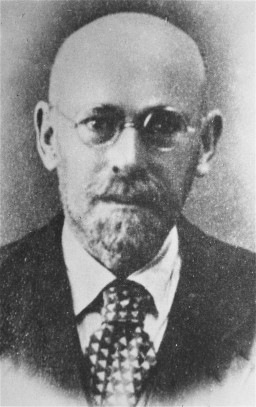
Aart Bouter, a Jehovah's Witness, was arrested by the Dutch police and deported to Sachsenhausen concentration camp. The Netherlands, 1946–47.
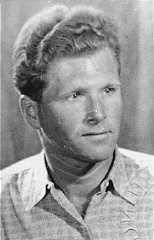
Hildegard Kusserow, a Jehovah's Witness, was imprisoned for four years in several concentration camps including Ravensbrück. Germany, date uncertain.
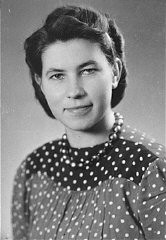
Portrait of Josef Kaplan. Kaplan was a youth movement leader. He was also a leader of the Warsaw ghetto underground and Jewish Fighting Organization (ZOB). He was caught preparing forged documents and was killed. Poland, before September 1942.
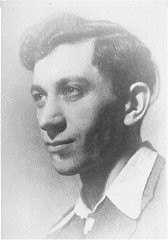
Portrait of Lazar Ischach, son of Yosef Ischach. He was a grocer and lived at Drinska 77 in Bitola. This photograph was one of the individual and family portraits of members of the Jewish community of Bitola, Macedonia, used by Bulgarian occupation authorities to register the Jewish population prior to its deportation in March 1943.
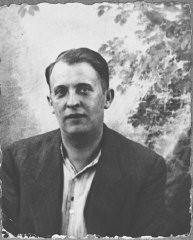
Portrait of Leon Pardo. He lived on Sremska in Bitola. This photograph was one of the individual and family portraits of members of the Jewish community of Bitola, Macedonia, used by Bulgarian occupation authorities to register the Jewish population prior to its deportation in March 1943.
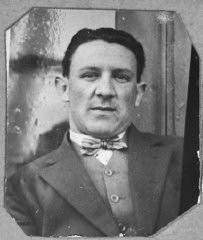
Gerhard and Margot's mother came from a Protestant family. She met her future husband when she went to work in the telephone exchange at his company. She converted to Judaism in 1920. The couple married in 1920, and in 1923 had their twins Gerhard and Margot. Both Gerhard and Margot would become active in Jewish youth movements, and took on Hebrew names (Gad and Miriam). On February 17, 1943, Gad was ordered to report to the temporary internment camp established at a former Jewish community building on…
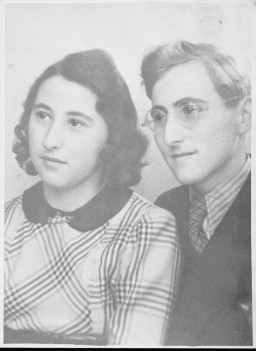
Portrait of Nazi Party official Martin Bormann. Bormann died in an effort to flee Berlin in the last days of World War II, but was long thought to be at large. He was tried in absentia at the International Military Tribunal in Nuremberg, where he was sentenced to death.
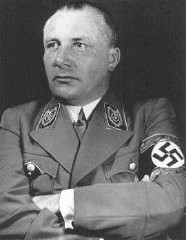
Portrait of members of a Hungarian Jewish family. They were deported to and killed in Auschwitz soon after this photo was taken. Kapuvar, Hungary, June 8, 1944.
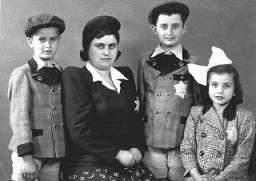
Group portrait of members of the Freemasons Lodge of Chernovtsy, Bukovina, approximately 75 percent of whom were Jewish. The members were mainly intellectuals and leaders in business and local government. Among those pictured are Dr. Max Ennis (top row, third from the left); pharmacist, Dr. Abraham Guttman (top row, far right); an official in the revenue service, Dr. Max Gottfried (second row from the top, sixth from the left); and the judge, Dr. Jacob Rubel (third row from the top, far left). Chernovtsy,…
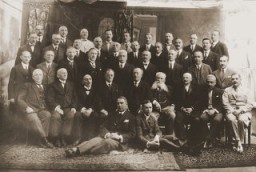
Portrait of Mordechai Mishulam. He was a dealer of second-hand items. He lived at Zmayeva 23 in Bitola. This photograph was one of the individual and family portraits of members of the Jewish community of Bitola, Macedonia, used by Bulgarian occupation authorities to register the Jewish population prior to its deportation in March 1943.
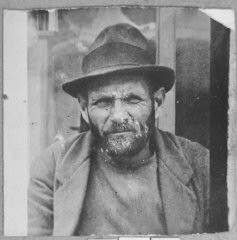
In this 1934 portrait of Norman Salsitz's family, Norman is seated in the front row (at left). In the top row, center, an image of one of Norman's brothers has been pasted into the photograph. This is seen by comparing the size of the brother's face with the others pictured. Pasting in images of family members who could not be present during family portraits was common practice and in some cases the resulting composite images are the only remaining visual records of family groups.
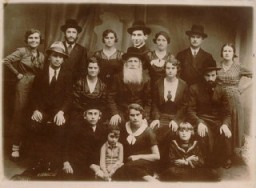
Portrait of Palomba Kalderon, daughter of Mushon Kalderon. She was a student and lived at Dalmatinska 65 in Bitola. This photograph was one of the individual and family portraits of members of the Jewish community of Bitola, Macedonia, used by Bulgarian occupation authorities to register the Jewish population prior to its deportation in March 1943.
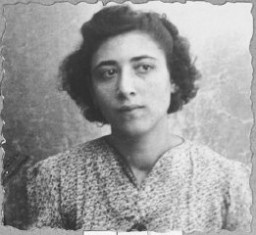
Portrait of Rabbi S. Djain, taken in Bitola. This photograph was one of the individual and family portraits of members of the Jewish community of Bitola, Macedonia, used by Bulgarian occupation authorities to register the Jewish population prior to its deportation in March 1943.
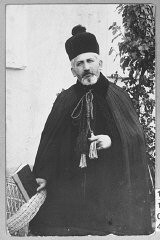
Portrait of Rabbi Shimon Hoberband, who was involved in the activities of Emanuel Ringelblum's Oneg Shabbat archives in the Warsaw ghetto.
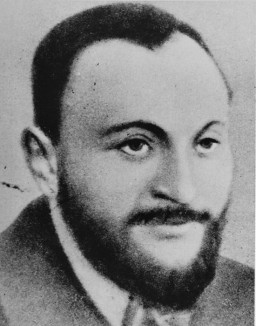
Reinhard Heydrich, chief of the SD (Security Service) and Nazi governor of Bohemia and Moravia. Place uncertain, 1942.
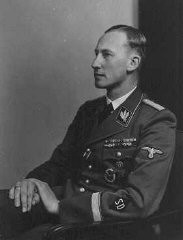
Portrait of Sara Ischach, wife of Lazar Ischach. She lived at Drinksa 77 in Bitola. This photograph was one of the individual and family portraits of members of the Jewish community of Bitola, Macedonia, used by Bulgarian occupation authorities to register the Jewish population prior to its deportation in March 1943.
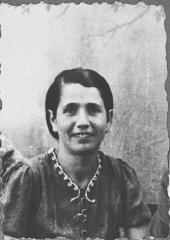
Portrait of Sara Israel, wife of Isak Israel. She lived at Krstitsa 10 in Bitola. This photograph was one of the individual and family portraits of members of the Jewish community of Bitola, Macedonia, used by Bulgarian occupation authorities to register the Jewish population prior to its deportation in March 1943.
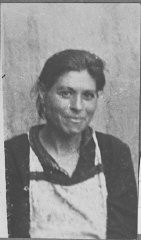
Portrait of Sigmund Freud. Freud's writings were burned during the 1933 book burnings.
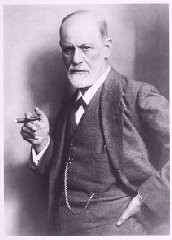
Portrait of Solomon Kalderon, son of Bohor Kalderon. He was a tailor and lived at Karagoryeva 67 in Bitola. This photograph was one of the individual and family portraits of members of the Jewish community of Bitola, Macedonia, used by Bulgarian occupation authorities to register the Jewish population prior to its deportation in March 1943.
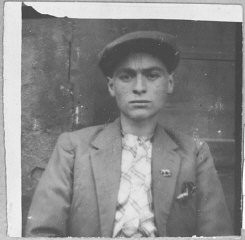
We would like to thank Crown Family Philanthropies, Abe and Ida Cooper Foundation, the Claims Conference, EVZ, and BMF for supporting the ongoing work to create content and resources for the Holocaust Encyclopedia. View the list of donor acknowledgement.